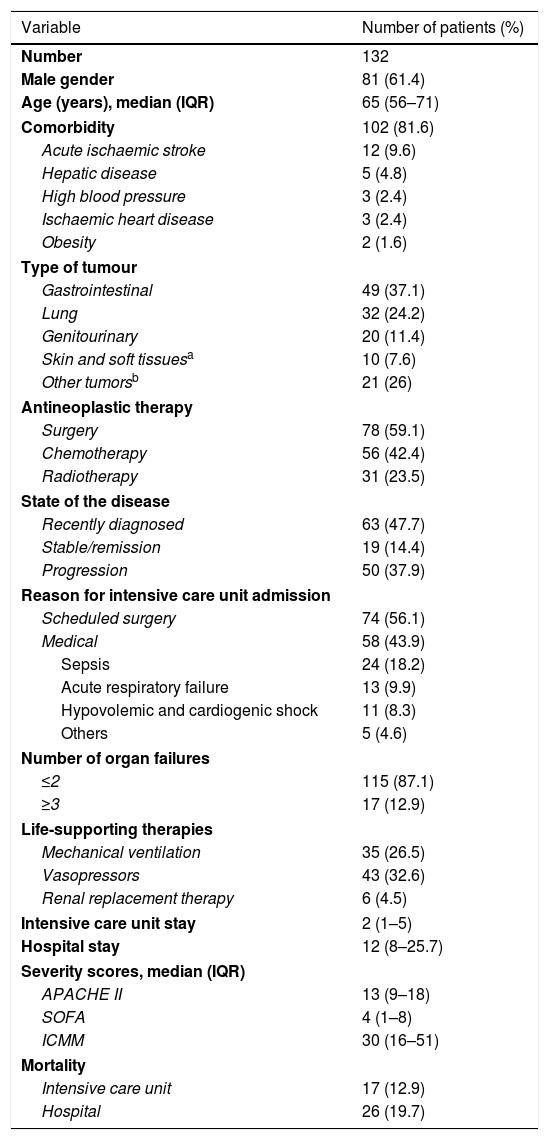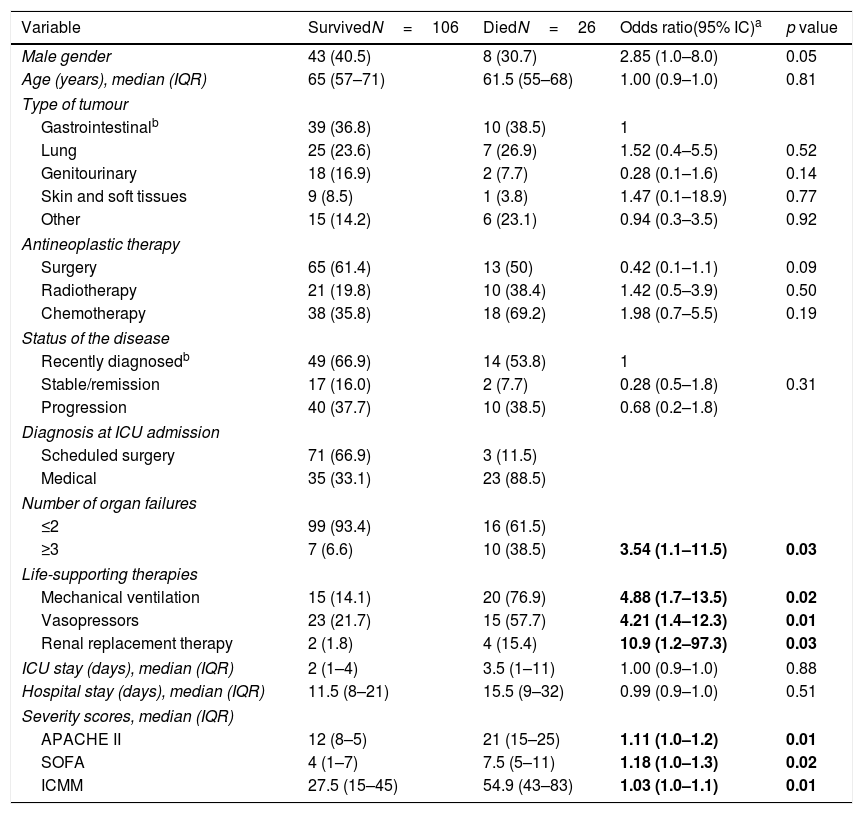To describe the characteristics and the evolution of patients with solid tumours admitted to the ICU and to identify factors associated with hospital mortality and to evaluate three illness severity scores.
Material and methodsDescriptive study including 132 patients with solid tumour admitted to the ICU (2010–2016). Demographics and cancer-related data, organ failures, life-supporting therapies and severity scores: APACHE II, SOFA and ICU Cancer Mortality Model (ICMM) were collected.
ResultsThere were 58 patients admitted for medical reasons and 74 for scheduled surgery. The ICU and hospital mortality rate were 12.9% and 19.7%, respectively. The medical reason for admission, the number of organ failures, and the need of life-supporting therapies were significantly associated with a higher mortality (p<0.05). In the logistic regression analysis, the three severity scores: SOFA (OR 1.18, 95% IC 1.14–1.48), APACHE II (OR 1.11, 95% CI 1.09–1.27), and ICMM (OR 1.03, 95% CI 1.02–1.07) were independently associated with a higher mortality (p<0.05). To evaluate the discrimination, the area under the receiver operating characteristics curves (AUROC) were calculated: APACHE II (0.795, 95% CI 0.69–0.9), SOFA (0.77, 95% CI 0.69–0.864) and ICMM (0.794, 95% CI 0.697–0.891). The comparison of AUC ROC after DeLong's test showed no difference between them.
ConclusionHospital mortality was associated with the type and severity of acute illness. The three severity scores were useful to assess outcome and accurate in the discrimination, but we did not find a significant difference between them.
Describir las características generales y la evolución de los pacientes con tumores sólidos ingresados en una unidad de cuidados intensivos (UCI), identificar los factores asociados a la mortalidad y evaluar el valor pronóstico de 3 escalas de gravedad.
Material y métodosEstudio descriptivo de 132 pacientes con diagnóstico de tumour sólido admitidos en la UCI (2010-2016). Se analizaron los datos demográficos relacionados con el tumour, la disfunción orgánica y las terapias de soporte vital, así como las escalas de gravedad APACHE II, SOFA e ICMM.
ResultadosIngresaron 58 pacientes por causa médica y 74 tras cirugía programada. La tasa de mortalidad en la UCI y hospitalaria fue del 12,9% y 19,7%, respectivamente. La causa médica de ingreso, el número de fallos orgánicos y la necesidad de terapias de soporte vital se asociaron significativamente con mayor mortalidad (p<0,05). En el análisis por regresión logística las 3 escalas evaluadas: SOFA (OR: 1,18; IC 95%: 1,14-1,48), APACHE II (OR: 1,11; IC 95%: 1,09-1,27) e ICMM (OR: 1,03; IC 95%: 1,02-1,07) se asociaron de forma independiente con una mayor mortalidad (p<0,05). Para evaluar la discriminación, se calcularon las AUROC: APACHE II (0,795; CI 95%: 0,69-0,9), SOFA (0,77; CI 95%: 0,69-0,864) e ICMM (0,794; CI 95%: 0,697-0,891). La comparación de las mismas por el test DeLong no mostró diferencias entre los sistemas de puntuación.
ConclusionesLa mortalidad hospitalaria se asoció con el tipo y la gravedad de la enfermedad aguda. Las e escalas de gravedad evaluadas fueron igualmente útiles para evaluar el pronóstico, sin mostrar diferencias entre ellas.










